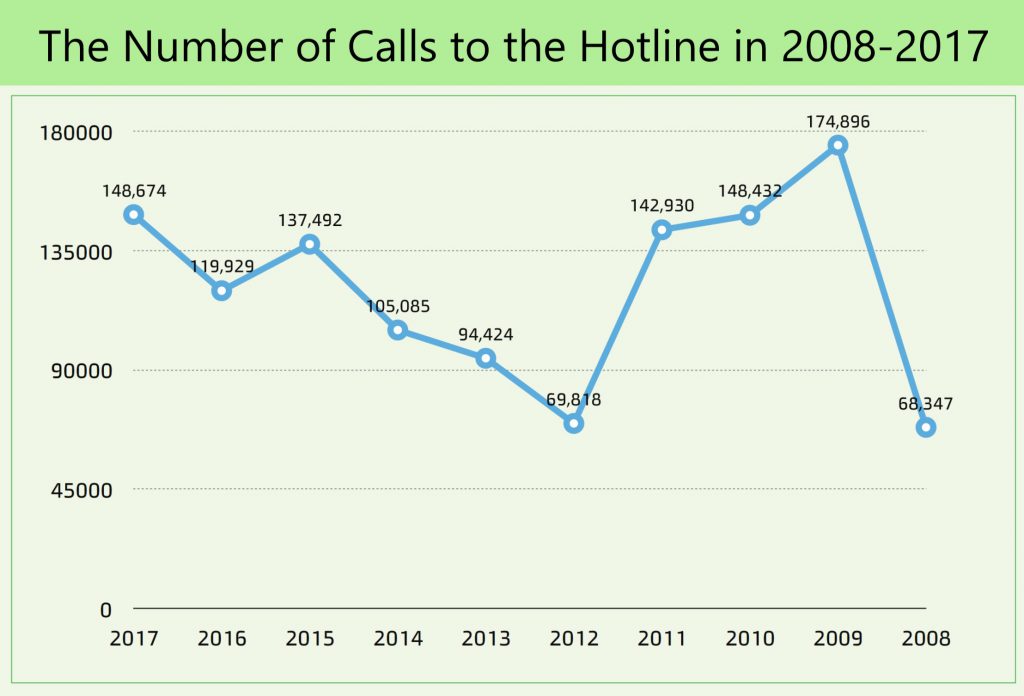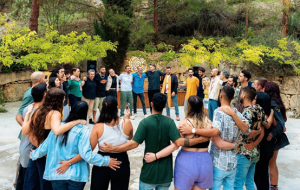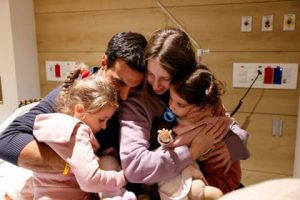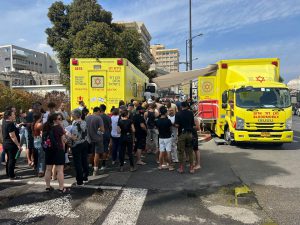Good Health and Well-Being


Home » Good Health and Well-Being » SDG 3- Caring for its Elderly – A Hotline for the Golden Generation
Caring for its Elderly - A Hotline for the Golden Generation
“You shall rise before the aged and show deference to the old” – Leviticus 19:32
Israel has a time-honored tradition of respecting and caring for its elderly. Children are taught from a young age to offer their bus seats to older passengers; teens across the country regularly volunteer in golden-age homes to visit with elderly residents.
The government has taken its care for the elderly a step further. A hotline for the elderly (*8840) has been created by The Ministry for Social Equality for the venerable generation to be able to reach a live person and have their questions answered about anything from healthcare to their rights as senior citizens, and to receive assistance with the implementation of their rights. These rights include social security benefits; Holocaust survivors benefits; aid and assistance from foreign workers; housing; pensions; preparation for retirement; welfare; culture and leisure; guardianship, and anything related to the daily lives of the aged in Israeli society.
The hotline runs Sunday through Thursday between the hours of 8:00 AM and 8:00 PM. Hotline operators are available for conversation in a choice of languages: Hebrew, Arabic, English, Spanish, Russian, German, French or Amharic. There are around one million elderly in Israel, representing 11.3% of the total population. Since its first day of operation ten years ago, the hotline has served 708,000 people, representing 9.8% of Israel’s total population. 208,000 of those aided received information and assistance relating to the rights of Holocaust survivors. On average, the hotline answers 120,000 calls per year. In the past three years — thanks to the hotline — pensioners have been able to cash in on their benefits, amounting in total up to 27,000 shekels.


In recent years, the hotline has begun to operate in conjunction with a number of governmental bodies in order to facilitate and inform its services, such as: The National Insurance Institute, including the Counselling Division for the Elderly; The Division for Legal Aid at the Department of Justice; The Population and Immigration Authority; The Ministry of Absorption; The Equal Opportunities Commission; The Consumer Protection Authority; The Israel Police; The Ministry of Social Affairs and Social Services; The Director of Pensions at the Ministry of Finance; The Foundation for the Benefit of Holocaust Victims; The Holocaust Survivors Rights Authority in the Ministry of Finance; local authorities; the departments of social services in the local authorities, and health insurances, among others.
As a result of these alliances, the hotline has amassed a wealth of knowledge and information that has aided its volunteers in managing the many challenges that come with advocating for the rights of elderly citizens. But even more than that, the hotline’s staff works diligently to change legislation and ensure that important decisions are drafted in the Knesset, like the payment of fees to lawyers who advocate for Holocaust survivor allowances, the prevention of water shutoffs, and the ease of procedures connected to aid from foreign workers. An even more recent, additional service of the hotline has been the provision of information about rights to the Ethiopian elderly community. Within two years the hotline was able to reach 3,500 (out of 10,000 in the country) elderly Ethiopians.
For 208,000 Holocaust survivors, in ten years of operation, the hotline has succeeded in earning 3,539,777 euros in reparations from Germany. The hotline continues to locate more survivors and award them with reparations. A city-by-city project was initiated by the hotline — in cooperation with city municipalities, the Ministry of Finance, the Ministry for Social Equality and The Holocaust Survivors Rights Authority — to train volunteers to educate Holocaust survivors about their rights and help them receive their due. Today more than 80 authorities across the country participate in this project, which has already helped thousands of Holocaust survivors take advantage of their rights.
A large-scale project of the hotline, which was in operation over two years, was the dissemination of information — via the hotline — about discounted electricity for elderly citizens. It came to light through a Knesset meeting that many of the elderly were not taking advantage of this discount because they were probably not aware of it. Not only did the hotline dispatch tens of thousands of calls to elderly citizens, in many cases volunteers even interceded with the electric company on behalf of their clients to ensure that their bills were discounted.


A “special unit” of the hotline operates in twelve hospitals across the country, whereby volunteers approach elderly patients to inform them about their rights and to assist them with a questionnaire regarding their rights. After their release from the hospital, care and assistance is smoothly transferred to the hotline. The initial connection that is made between the volunteer and the elderly patient in the hospital has proven to be an effective and successful means of transitioning services from hospital to hotline.
In 2016 the hotline and its volunteers were awarded by the Civil Service Commission for their services on behalf of the elderly community, in particular for streamlining and reducing beurocratic processes for the actualization of their rights. In 2017 the hotline was bestowed third place by the Government Telecommunications Authority in the category of Phone Service for excellence and enhancement in their provision of services, thus earning it a place on the list of the government’s top offices for 2016. This recognition reflected the guiding principles of the hotline from its first day of operation, namely, to provide quality, professional, and caring services to Israel’s elderly citizens.
The hotline continues to grow alongside the elderly population it serves. With this growth will come an expansion of channels, both digital and traditional, as well as a broadening of professional services, offered in several languages. The hotline proudly continues to be the leading governmental office in the service of the elderly, and the foremost expert in the rights of Israel’s golden-aged population.
Of special note are several other government-supported programs for the elderly: “Supportive Community” offers elderly citizens the physical, medical, social and communal support they require in order to conduct their lives in their own homes. Volunteer programs, like the “Bracha Project”, “Meals on Wheels”, “Fix-It Patrol”, “Documentation of Life Stories Project” and “Ben-Gurion Patrol” are subsets of the greater arm of elderly programs created by the Ministry of Labor, Social Affairs and Social Services, bringing quality of life to senior citizens who wish to remain at home.
Related articles


SDG 3 – Renewal of Body and Spirit -By Dr. Eitan Eliram Lead Innovation Strategist- Feb 2024
Good Health and Well-Being SDG 3 – Renewal of Body and Spirit Like all the survivors of the October 7 Hamas massacre, those who lived


SDG 3 – Treating Children Out of Captivity
Good Health and Well-Being SDG 3 – Treating Children Out of Captivity The burden on Israeli authorities entrusted with the medical repatriation of mothers and


SDG 3 – Resilience -By Dr. Eitan Eliram Lead Innovation Strategist
Good Health and Well-Being SDG 3 – Resilience As Israel grieves, its people are standing up during these most difficult of hours to help those in need –


















